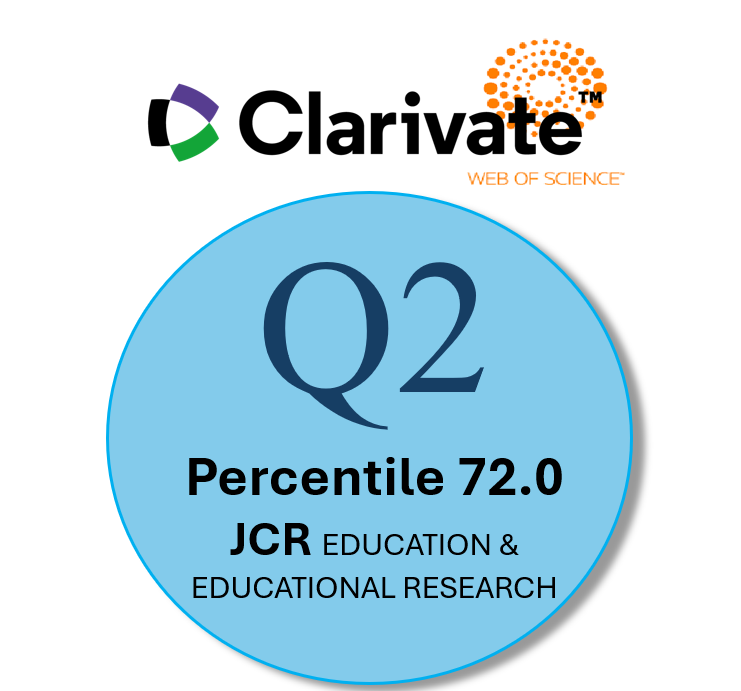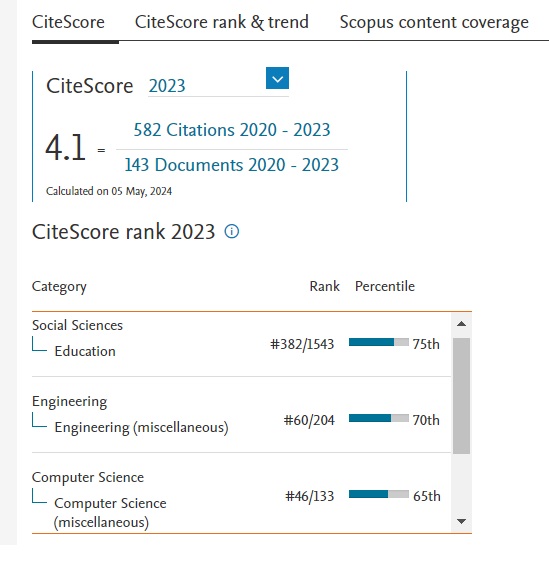Pensamiento computacional basado en realidad virtual y razonamiento complejo: caso de estudio secuencial
Agencias de apoyo
- Instituto para el Futuro de la Educación, Proyecto ID I003 -IFE001-C2-T3-T
Resumen
El desarrollo del Pensamiento Computacional (PC) en la formación escolar es considerado indispensable para habilitar a los estudiantes en la resolución de problemas complejos mediante el despliegue de habilidades como la identificación de patrones y el diseño de algoritmos. En este artículo se describe la evaluación de una experiencia de aprendizaje de los componentes del PC desde el enfoque del razonamiento complejo (R4C) utilizando una aplicación de realidad virtual basada en web (WebVR) llamada Virtual Campus. El método fue intrínseco de caso único con diseño de estudio secuencial basado en métodos cuantitativos. Se aplicaron dos instrumentos a 176 estudiantes de nivel medio superior, el primero para medir la aceptación del entorno virtual y el segundo para valorar el desarrollo del razonamiento complejo. Los resultados indican que la aprobación del entorno y de sus herramientas fue muy satisfactorio, asimismo, vivir la experiencia de aprendizaje favoreció el logro de las competencias de pensamiento científico y crítico. Por lo anterior, se puede afirmar que la convergencia PC-R4C-WebVR permite generar dinámicas de aprendizaje innovadoras, alineadas con las demandas de una educación en constante cambio y que contribuyen en la mejora de prácticas para la resolución problemas.
Descargas
-
Resumen2207
-
PDF1117
Citas
Álvarez, M. (2016). Knowledge of knowledge: The work of Edgar Morin and the problem of Mexican education. IE Revista de Investigación Educativa de la REDIECH, 7, 6-20
Andrew F. & Jacob J. (2020): Use Omega Rather than Cronbach’s Alpha for Estimating Reliability. But…, 14, 1-24, Communication Methods and Measures. https://doi.org/10.1080/19312458.2020.1718629
Ángel, C., Segredo, E., Arnay, R. & León, C. (2020). Simulador de Robótica Educativa para la promoción del Pensamiento Computacional. Revista de Educación a Distancia (RED), 20(63). https://doi.org/10.6018/red.410191
Baena, J., Ramírez, M., Mazo, D. & López, E. (2022). Traits of complex thinking: A bibliometric review of a disruptive construct in education. Journal of Intelligence, 10(3). https://doi.org/10.3390/jintelligence10030037
Basogain, X., Olabe, M. y Olabe, J.C., (2015). Pensamiento Computacional a través de la Programación: Paradigma de Aprendizaje. RED. Revista de Educación a Distancia, 46(6). http://www.um.es/ead/red/46
Bers, M., González, C., & Armas, M. (2019). Coding as a playground: Promoting posi¬tive learning experiences in childhood classrooms. Computers & Education, 138, 130-145. https://doi.org/10.1016/j.compedu.2019.04.013
Chekantseva, Z. (2017). The appropriation of knowledge about complex systems by some nursing theorists: A little-known disciplinary issue. Istoriya-Elektronnyi Nauchno-Obrazovatelnyi Zhurnal, 8, 1–16. https://doi.org/10.18254/S0002011-1-1
Fuentes, A., López, J., Pozo, S. (2019). Análisis de la Competencia Digital Docente: Factor Clave en el Desempeño de Pedagogías Activas con Realidad Aumentada. REICE. Revista Iberoamericana sobre Calidad, Eficacia y Cambio en Educación, 17(2), 27-42. https://doi.org/10.15366/reice2019.17.2.002
Glasserman-Morales, L., Ruiz-Ramírez, J. & Estrada, F. J. R. (2022). Transforming Higher Education Using WebVR: A Case Study. IEEE Revista Iberoamericana de Tecnologias Del Aprendizaje, 1(1), 1. https://doi.org/10.1109/RITA.2022.3191257
García, A. & Caballero, Y. (2019). Robótica para desarrollar el pensamiento computacional en Educación Infantil. Comunicar: Revista científica iberoamericana de comunicación y educación, 27(59), 63-72. https://doi.org/10.3916/C59-2019-06
Gonçalves, J., Lima, J., Brito, T., Brancalião, L., Camargo, C., Oliveira, V. & Conde, M. (2019). Educa¬tional Robotics Summer Camp at IPB: A Challenge based learning case study. In Proceedings of the Seventh International Conference on Technological Ecosystems for Enhancing Multiculturality, 36-43. New York: ACM. https://doi.org/10.1145/3362789.3362910
González, C. (2019). Estado del arte en la enseñanza del pensamiento computacional y la programación en la etapa infantil. Education in the Knowledge Society, 20, 1-15. https://doi.org/10.14201/eks2019_20_a17
Grover, S. & Pea, R. (2017). Computational Thinking: A competency whose time has come. In Sentence, S., Barendsen, E. Schulte, C. Computer science education: Perspectives on teaching and learning in school. Bloomsbury Academic. https://doi.org/0.5040/9781350057142.ch-003
Jauhiainen, J. (2021). Entrepreneurship and innovation events during the COVID-19 pandemic: The user preferences of VirBELA virtual 3D platform at the SHIFT event organized in finland. Sustainability, 13(7). https://doi.org/10.3390/su13073802
Jin, Y., Lin, C., Zhao, Q., Yu, S. & Su, Y. (2021). A study on traditional teaching method transferring to E-learning under the covid-19 pandemic: From chinese students' perspectives. Frontiers in Psychology, 12. https://doi.org/10.3389/fpsyg.2021.632787
Koerber, S. & Osterhaus, C. (2019) Individual differences in early scientific thinking: assessment, cognitive influences, and their relevance for science learning. Journal of Cognition and Development, 20(4), 510-533. https://doi.org/10.1080/15248372.2019.1620232
McNeish, D. (2018). Thanks coefficient alpha, we’ll take it from here. Psychological Methods, 23, 412–433. https://doi.org/10.1037/met0000144
Miranda, J., Navarrete, C., Noguez, J., Molina, J., Ramírez, M., Navarro, S., Bustamante, R., Rosas, J. & Molina, A. (2021). The core components of education 4.0 in higher education: Three case studies in engineering education. Computers & Electrical Engineering, 93, 107278. https://doi.org/10.1016/j.compeleceng.2021.107278
Montiel, H. & Gomez, M. (2021). Educational Challenges for Computational Thinking in K–12 Education: A Systematic Literature Review of “Scratch” as an Innovative Programming Tool. Computers, 10, 69. https://doi.org/10.3390/computers10060069
Neroni, M., Oti, A. & Crilly, N. (2021). Virtual Reality design-build-test games with physics simulation: opportunities for researching design cognition. International Journal of Design Creativity and Innovation, 9 (3), 13973. https://doi.org/10.1080/21650349.2021.1929500
Niemi, H. & Kousa, P. (2020). A case study of students’ and teachers’ perceptions in a Finnish high school during the COVID pandemic. International Journal of Technology in Education and Science, 4(4), 352-369. https://doi.org/10.46328/ijtes.v4i4.167
Nouri, J., Zhang, L., Mannila, L. y Norén, E. (2020) Development of computational thinking, digital competence and 21st century skills when learning programming in K-9, Education Inquiry, 11(1), 1-17. https://doi.org/10.1080/20004508.2019.1627844
Ortega, B. & Asensio, M. (2018). DIY robotics: computational thinking based patterns to improve problem solving. Revista Latinoamericana de Tecnología Educativa-Relatec, 17(2), 129–143. https://doi.org/10.17398/1695-288X.17.2.129
Papert, S. (1980). Mindstorms: Children, computers, and powerful ideas. Nueva York: Basic Books.
Radianti, J., Majchrzak, T., Fromm, J. & Wohlgenannt, I. (2020). A systematic review of immersive virtual reality applications for higher education: Design elements, lessons learned, and research agenda. Computers & Education, 147, 103778. https://doi.org/10.1016/j.compedu.2019.103778
Ramírez, M., Álvarez, I., Sanabria, J., Lopez, E., Alonso, P. & Miranda, J. (2021). Scaling complex thinking for everyone: A conceptual and methodological framework. Paper presented at the ACM International Conference Proceeding Series, 806-811. https://doi.org/10.1145/3486011.3486562
Ramírez, M., Castillo, I., Sanabria, J. & Miranda, J. (2022). Complex thinking in the framework of education 4.0 and open Innovation—A systematic literature review. Journal of Open Innovation: Technology, Market, and Complexity, 8(1). https://doi.org/10.3390/joitmc8010004
Rodríguez del Rey, Y., Cawanga, I., Deco, C., Bender, C., Avello, R., & Villalba, K. (2020). Developing computational thinking with a module of solved problems. Computer Applications in Engineering Education. https://doi.org/10.1002/cae.22214
Rose, S., Habgood, J. & Jay, T. (2017). An exploration of the role of visual programming tools in the development of young children’s computational thinking. Electronic Journal of E-Learning, 15(4), 297–309. https://eric.ed.gov/?id=EJ1154629
Sahlberg, P. (2020). Does the pandemic help us make education more equitable? Educational Research for Policy and Practice, 20, 1-8. https://doi.org/10.1007/s10671-020-09284-4
Shirey, K. & Chandramouli, M. (2021). Work in progress pilot study: Virtual reality for computational thinking foundations and STEM enrichment. Paper presented at the ASEE Annual Conference and Exposition, Conference Proceedings. https://peer.asee.org/38113
Smith, T. & Knowles, A. (2017). How can we elicit more complex thinking in Year 7 students for understanding and resolving life-issues? International Journal of Christianity & Education, 21, 225–39. http://dx.doi.org/10.1177/2056997117712728
Sukirman, S., Ibharim, L., Said, C. & Murtiyasa, B. (2022). A strategy of learning computational thinking through game based in virtual reality: Systematic review and conceptual framework. Informatics in Education, 21(1), 179-200. https://doi.org/10.15388/infedu.2022.07
Tobar, C., Garcés, M., Crespo, M. C., & Sisa, I. (2021). The impact of strengthening study habits for medical students during COVID-19 academic transition: A mixed-methods study. Medical Science Educator, 31(3), 1083-1090. https://doi.org/10.1007/s40670-021-01277-z
Tobón, S. & Luna, J. (2021). Complex Thinking and Sustainable Social Development: Validity and Reliability of the COMPLEX-21 Scale. Sustainability, 13, 6591. https://doi.org/10.3390/su13126591
Valverde, J., Fernández, M. y Garrido, M. (2015). El pensamiento computacional y las nuevas ecologías del aprendizaje. RED, Revista de Educación a Distancia. 46(3). https://revistas.um.es/red/article/view/240311
Varona, F. (2020). El carácter integrador del pensamiento de Morin en la formación universitaria. Sophia, Colección de Filosofía de la Educación, 1, 93–125. https://doi.org/10.17163/soph.n29.2020.03
Vásquez, M. & Viguri, M. (2020). Complex Thinking in the Social Sciences: towards a new Business Organization. Revista Ciencias de la Complejidad, 1, 51–66. https://doi.org/10.48168/cc012020-004
Vázquez, J., Castillo, I., Ramírez, M., Millán, A. (2022). Development of the perception of achievement of complex thinking: A disciplinary approach in a Latin American student population. Education Sciences, 12, art. 289. https://doi.org/10.3390/educsci12050289
Videva, J., Marchiori, E. & Cantoni, L. (2019) Assessing usability and user experience of immersive web VR platforms for tourism destinations. e-Review of Tourism Research, 17(2). https://journals.tdl.org/ertr/index.php/ertr/article/view/509
Vorobyeva, D. V., Leukhin, A. D., & Kugurakova, V. V. (2017). Vr & Web Gui Shell: Interactive Web-System for Virtual Reality. Revista Publicando, 4(13 (2), 542-554. https://revistapublicando.org/revista/index.php/crv/article/view/914
Wing, J. (2006). Computational thinking. it represents a universally applicable attitude and skill set everyone, not just computer scientists, would be eager to learn and use. Commun. ACM, 49(3). https://doi.org/10.1109/vlhcc.2011.6070404
Wing, J. (2008). Computational thinking and thinking about computing. The Royal Society Publishing. https://doi.org/10.1098/rsta.2008.0118
Xia, J., Xiao, B., Li, D., & Wang, K. R. (2018). Improvement of virtual EAST system based on WebVR. Fusion Engineering and Design, 127, 267-274. https://doi.org/10.1016/j.fusengdes.2018.01.024
Yadav, A., Hong, H., y Stephenson, C. (2016). Computational thinking for all: Pedagogical approaches to embedding a 21st century problem solving in K-12 classrooms. TechTrends. https://doi.org/10.1007/s11528-016-0087-7
Ye, Q., Hu, W., Zhou, H., Lei, Z. & Guan, S. (2018). VR interactive feature of HTML5-based WebVR control laboratory by using head-mounted display. International Journal of Online Engineering, 14(3), 20-33. https://doi.org/10.3991/ijoe.v14i03.8112
Derechos de autor 2023 Revista de Educación a Distancia (RED)

Esta obra está bajo una licencia internacional Creative Commons Atribución-NoComercial 4.0.
Las obras que se publican en esta revista están sujetas a los siguientes términos:
1. El Servicio de Publicaciones de la Universidad de Murcia (la editorial) conserva los derechos patrimoniales (copyright) de las obras publicadas, y favorece y permite la reutilización de las mismas bajo la licencia de uso indicada en el punto 2.
2. Las obras se publican en la edición electrónica de la revista bajo una licencia Creative Commons Reconocimiento-NoComercial-SinObraDerivada 3.0 España (texto legal). Se pueden copiar, usar, difundir, transmitir y exponer públicamente, siempre que: i) se cite la autoría y la fuente original de su publicación (revista, editorial y URL de la obra); ii) no se usen para fines comerciales; iii) se mencione la existencia y especificaciones de esta licencia de uso.
3. Condiciones de auto-archivo. Se permite y se anima a los autores a difundir electrónicamente las versiones pre-print (versión antes de ser evaluada) y/o post-print (versión evaluada y aceptada para su publicación) de sus obras antes de su publicación, ya que favorece su circulación y difusión más temprana y con ello un posible aumento en su citación y alcance entre la comunidad académica. Color RoMEO: verde.














